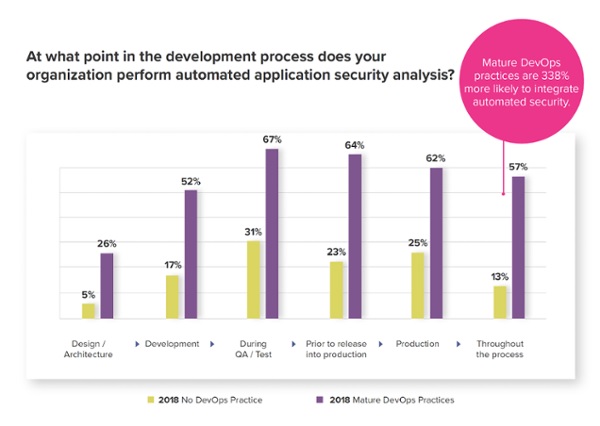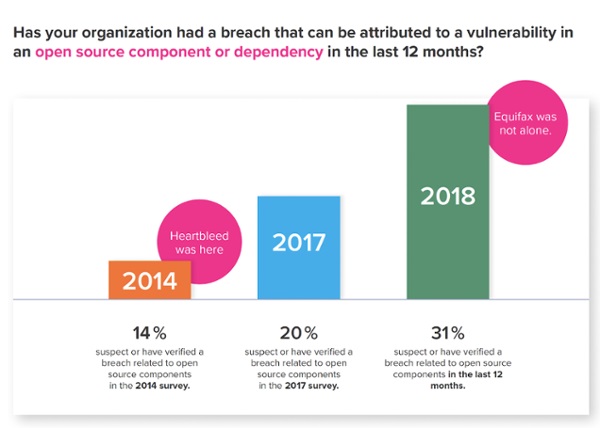GitLab announced the general availability of GitLab Duo with Amazon Q.
Survey respondents with mature DevOps practices were 338% more likely to integrate automated security than organizations with no DevOps practice, according to The 2018 DevSecOps Community Survey from Sonatype.

After another record year of breaches, analysis of responses found that 3 in 10 organizations suspected or verified breaches stemming from vulnerabilities in open source components — a 55% increase over 2017, and 121% increase since 2014.

This year’s survey also found that investments in open source governance (44%), container security (56%), and web application firewalls (58%) were noted as the most critical to organizations pursuing DevSecOps transformations.
"The appeal of using one technology that’s free rather than buying a licenced, chargeable piece of software is apparent. But so are the risks. It is concerning that some developers are simply ignoring the policies crafted and communicated for their organizations, likely for the sake of speed and costs," said Helen Beal, DevOpsologist at Ranger4.
“As application breaches tied to open source components jumped more than 50% year over year, those investing in DevSecOps showed 85% higher levels of cyber readiness, compared to those who aren’t,” said Wayne Jackson, CEO of Sonatype. “It’s evident that recent high profile breaches have heightened investments in DevSecOps. The survey also revealed strong investments from organizations striving to stay ahead of May 2018’s ‘secure by design’ requirement stipulated within the EU’s General Data Protection Regulation (GDPR)”.
Other key findings from the survey include:
■ 77% of mature DevOps organizations have open source policies in place, with a 76% adherence rate. Conversely, only 58% of respondents without mature DevOps practices had a policy with a 54% adherence rate — revealing that adding automated governance to DevSecOps is difficult to ignore.
■ 59% of mature DevOps organizations are building more security automation into their development process as attention toward GDPR compliance grows.
■ 88% of those with mature DevOps practices are investing in application security training, while 35% with immature practices said they had no access to security training. This finding points to stronger cybersecurity readiness postures of those investing in DevOps.
■ 63% of respondents with mature DevOps practices say they leverage security products to identify vulnerabilities in containers, as these components become more ubiquitous in modern IT landscapes.
■ 48% of respondents admitted that Developers know application security is important, but they don’t have the time to spend on it, shedding light on the growth in automated security investments.
About the Survey: The 2018 DevSecOps Community Survey provides visibility into the attitudes of software professionals toward DevOps best practices and the changing role of application security. The survey was conducted by Sonatype, Carnegie Mellon’s Software Engineering Institute, Contino, DZone, Ranger4, SJ Technologies, and Signal Sciences. The survey’s margin of error is ±2.02 percentage points for 2,076 IT professionals at the 95% confidence level.
Industry News
Perforce Software and Liquibase announced a strategic partnership to enhance secure and compliant database change management for DevOps teams.
Spacelift announced the launch of Saturnhead AI — an enterprise-grade AI assistant that slashes DevOps troubleshooting time by transforming complex infrastructure logs into clear, actionable explanations.
CodeSecure and FOSSA announced a strategic partnership and native product integration that enables organizations to eliminate security blindspots associated with both third party and open source code.
Bauplan, a Python-first serverless data platform that transforms complex infrastructure processes into a few lines of code over data lakes, announced its launch with $7.5 million in seed funding.
Perforce Software announced the launch of the Kafka Service Bundle, a new offering that provides enterprises with managed open source Apache Kafka at a fraction of the cost of traditional managed providers.
LambdaTest announced the launch of the HyperExecute MCP Server, an enhancement to its AI-native test orchestration platform, HyperExecute.
Cloudflare announced Workers VPC and Workers VPC Private Link, new solutions that enable developers to build secure, global cross-cloud applications on Cloudflare Workers.
Nutrient announced a significant expansion of its cloud-based services, as well as a series of updates to its SDK products, aimed at enhancing the developer experience by allowing developers to build, scale, and innovate with less friction.
Check Point® Software Technologies Ltd.(link is external) announced that its Infinity Platform has been named the top-ranked AI-powered cyber security platform in the 2025 Miercom Assessment.
Orca Security announced the Orca Bitbucket App, a cloud-native seamless integration for scanning Bitbucket Repositories.
The Live API for Gemini models is now in Preview, enabling developers to start building and testing more robust, scalable applications with significantly higher rate limits.
Backslash Security(link is external) announced significant adoption of the Backslash App Graph, the industry’s first dynamic digital twin for application code.
SmartBear launched API Hub for Test, a new capability within the company’s API Hub, powered by Swagger.
Akamai Technologies introduced App & API Protector Hybrid.













